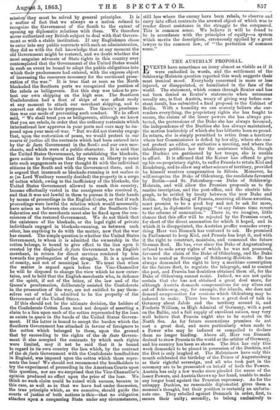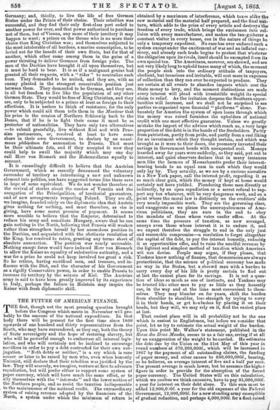THE AUSTRIAN PROPOSAL. E VENTS have sometimes an irony almost as
visible as if it were embodied in words, and the settlement of the Schleswig-Holstein question reported this week suggests their most ironical mood. Everybody concerned is more or less injured, or disappointed, or humiliated in the face of the world. The statement, which comes through Reuter and has not been denied as Reuter's statements when erroneous usually are, is that Austria, weary of giving way before con- stant insult, has submitted a final proposal to the Cabinet of Berlin. With a humility we can scarcely believe she sur- renders everything, the proprietary rights she has fought to secure, the claims of the lesser powers she has always pro- tected, the pretensions of the Duke she has always favoured, the independence of the Duchies she has always maintained, the marine leadership of which she has hitherto been so proud. In return, she is simply permitted to retire from a territory where her Commissioner is defied by her ally, where she can- not protect an editor, or authorize a meeting, and where the inhabitants petition her for the assistance which, though the Duchies are garrisoned by her troops, she is unable to afford. It is affirmed that the Kaiser has offered to give up his co-proprietary rights, to suffer Prussia to retain Kiel and Rendsburg, and to allow any other seizure of territory, provided he himself receives compensation in Silesia. Moreover, he will recognize the Duke of Oldenburg, the candidate favoured by Berlin—and St. Petersburg—as Duke of Schleswig- Holstein, and will allow the Prussian proposals as to the marine inscription, and the post-office, and the electric tele- graph, to be settled by treaty between the new Duke and Berlin. Only the King of Prussia, receiving all these sweeties, must promise to be a good boy and not to ask for more, must not, in diplomatic language " at any future time revert to the scheme of annexation." There is, we imagine, little chance that this offer will be rejected by the Prussian court, fur short of the direct annexation for which it hoped, and in which it is disappointed, the Austrian proffer concedes every- thing Herr von Bismark has ventured to ask. He promised in Parliament to keep Kid, and Prussia has kept it, and with it the right to construct, maintain, and command the future German fleet. He has, ever since the Duke of Augustenburg refused to cede away rights of which he was not possessed, favoured the claim of the Duke of Oldenburg, and the Duke is to be seated as Sovereign of Schleswig-Holstein. He has always demanded the right to levy a maritime conscription for the future fleet, to regulate the telegraph, and to control tho post, and Prussia has doubtless obtained them all, for the Duke of Oldenburg cannot resist. Indeed, we are not quite certain that she has not obtained a great deal more, for although Austria demands compensations for any slices cut out of Schleswig, say, for example, the islands, she does not demand compensation for cessions which Oldenburg may be induced to make. There has been a great deal of talk in Germany about Jande and the territory around it,. and Frederic William, as High Admiral of Germany, with a port on the Baltic, and a full supply of excellent sailors, may very well believe that Prussia ought also to be seated on the North Sea. As for future annexations promises do not cost a great deal, and more particularly when made to a Power who may be induced or compelled to declare them no longer binding. Above all, Herr von Bismark desired to show Prussia to the world as the arbiter of Germany, and his country has been so shown. The Diet has only this week demanded to be placed in possession of the Duchies, and the Diet is only laughed at. The Holsteiners have only this month celebrated the birthday of the Prince of Augustenburg as their rightful sovereign, and all who took part in the ceremony are to be prosecuted on behalf of both the Powers. Austria has only a few weeks since pleaded the cause of the lesser Powers, and Austria throws up her hand, unable to make any longer head against the Prussian supremacy. As for the unhappy Duchies, no reasonable diplomatist gives them a moment's thought, but their position is certainly an unfortu- nate one. They rebelled against Denmark in order, first, to secure their unity; secondly, to belong exclusively to • Germany; and, thirdly, to live the life of free German States under the Prince of their choice. Their rebellion was successful, and they find their only first-class port ceded to another power for ever, and that power authorized to purchase not of them, but of Vienna, any more of their territory it may happen to want; a prince on the throne who is no more their choice than King Christian was ; and themselves subjected to the most intolerable of all burdens, a marine conscription, to be levied not for the benefit of their own State, but for that of another, which other came among them in the guise of a power thirsting to deliver Germans from foreign yoke. The men of the Duchies have brought it all upon themselves, but it must be hard to bear. It is as if a malignant genius had granted all their requests, with a " rider " to neutralize each boon. They demanded to be united, and they are, with an enemy planted in the strongest conceivable position just between them. They demanded to be German, and they are, in all but freedom to live like the population of any other German State. They would be free of King Christian, and they are, only to be subjected to a prince at least as foreign to their affections. It is useless to think of resistance, for the only power which could aid them tells them in the Moniteur that his price is the cession of Northern Schleswig back to the Danes, that if he is to fight their cause it must be as protector of nationalities. They have only two alternatives —to submit gracefully, live without Kiel and with Prus- sian postmasters, or, resolved at least to have some share in their own Government, to declare by an unani- mous plebiseitum for annexation to Prussia. That must be their ultimate fate, and if they accepted it now they could help to swell the majority which may one day call Herr von Bismark and the Hohenzollerns equally to account.
It is exceedingly difficult to believe that the Austrian Government, which so recently denounced the voluntary surrender of territory as introducing a new and unknown element into politics, can have suggested terms like these save in hope of some equivalent. We do not wonder therefore at the revival of stories about the cession of Venetia and the occupation of the Principalities, of territorial guarantees, and of new arrangements respecting Poland. They are all,, we imagine, founded solely on the diplomatic idea that Austria gives nothing for nothing, and must therefore, as she is giving, have some secret promise of payment. It seems more sensible to believe that the Emperor, determined to reduce his army and conciliate Hungary, aware that he can gain nothing in the North, believing that Prussia will weaken rather than strengthen herself by her anomalous position in the Duchies, and acquainted with the obstinate resolution of the King, has resolved to retire, granting any terms short of absolute annexation. The position was nearly untenable. Nothing except force would have induced Herr von Bismark to allow the Kaiser an equality of substantive authority, and a war for a prize he could not keep involved too great a risk. So he retires, having sacrificed men, and treasure, and in- fluence with the Diet, and the character of his Government as a rigidly Conservative power, in order to enable Prussia to increase its territory by the seizure of Kiel. The Austrian army is said to hi.ve been greatly improved by its experience in Italy, perhaps the failure in Holstein may inspire the
Kaiser with fresh diplomatic skill. •































 Previous page
Previous page